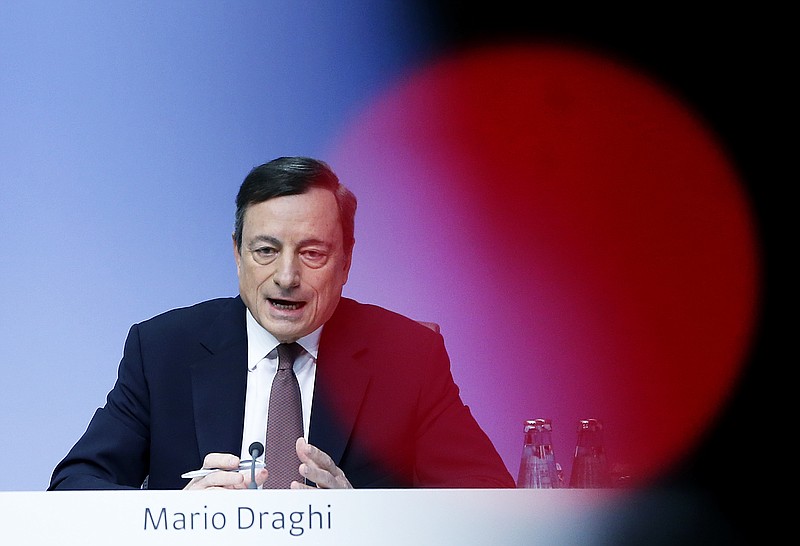FRANKFURT, Germany (AP) - European Central Bank head Mario Draghi says the bank's stimulus efforts need to be "persistent" even as the economy recovers and that any scaling back of support will come gradually.
Draghi's said in a speech Tuesday at an ECB conference in Sintra, Portugal, that "there are strong grounds for prudence" in adjusting the level of stimulus. He said that any changes "will have to be made gradually."
Market observers are watching for signals about when the ECB will start reducing its 60 billion euros ($67 billion) per month in bond purchases, a program that aims to increase inflation and growth. The central bank has edged toward the exit in recent comments, saying that risks to the economy have lessened and it could even do better than expected.
Despite such comments, Draghi has made no clear indication of exactly when the purchases might be scaled back. They are slated to run at least through year end, and longer if needed. Many analysts think the bank might give a clear signal at its September meeting, although some predictions have started to slip toward the October meeting.
Draghi indicated that any such scaling back would be very cautious. He said that even now some level of the stimulus "is still needed" and that bank policy "needs to be persistent and we need to be prudent about how we adjust the parameters."
He said that inflation was not picking up as fast as it typically does. That could be because wage and price decisions were still affected by the crisis and Great Recession. Because of the bout of low inflation that followed, people were still writing smaller increases into wage contracts. He said that such "backward-lookingness" would eventually give way to stronger inflation as the recovery continues but it would take time.
Meanwhile, he said, the bank would keep the level of stimulus needed by the economy, moving in step with the recovery so that monetary policy remains supportive, or "accommodative:" ''As the economy continues to recover, a constant policy stance will become more accommodative, and the central bank can accompany the recovery by adjusting the parameters of its policy instruments - not in order to tighten the policy stance, but to keep it broadly unchanged."
The ECB is trying to raise inflation from the current 1.4 percent toward its goal of just under 2 percent, a level it considers most consistent with a healthy economy. Inflation has lagged even during 16 straight quarters of growth for the 19 countries that use the euro currency.
The stimulus withdrawal decision is being closely watched because it could have wide-ranging effects on investors, governments and consumers. The bond purchases aim to drive down long-term interest rates and raise inflation by sending newly printed money into the banking system and the economy. When they end, rates should rise, meaning higher costs for longer-term borrowers such as people with house mortgages. Savings accounts or other conservative holdings would become more attractive relative to stocks.
